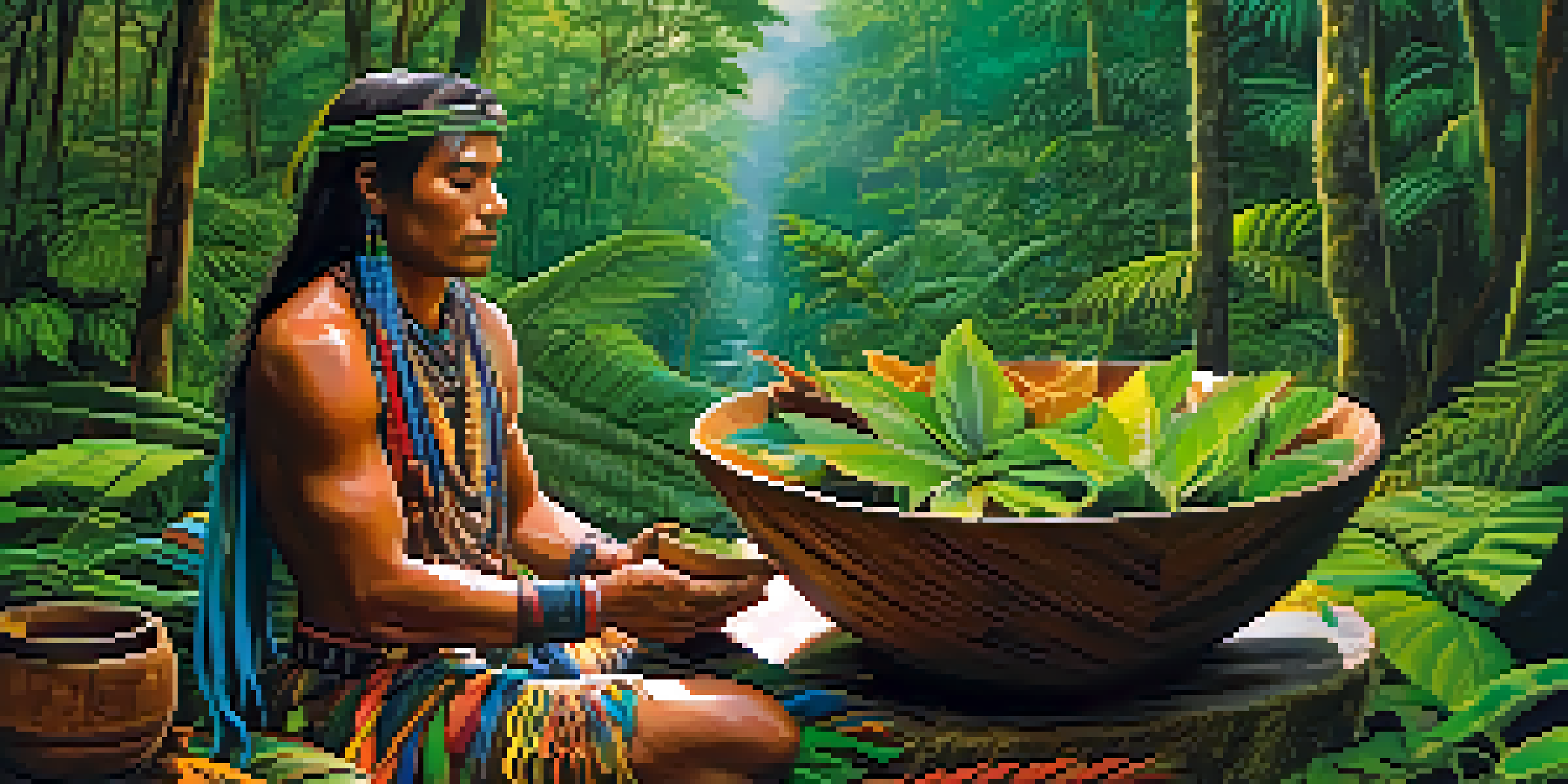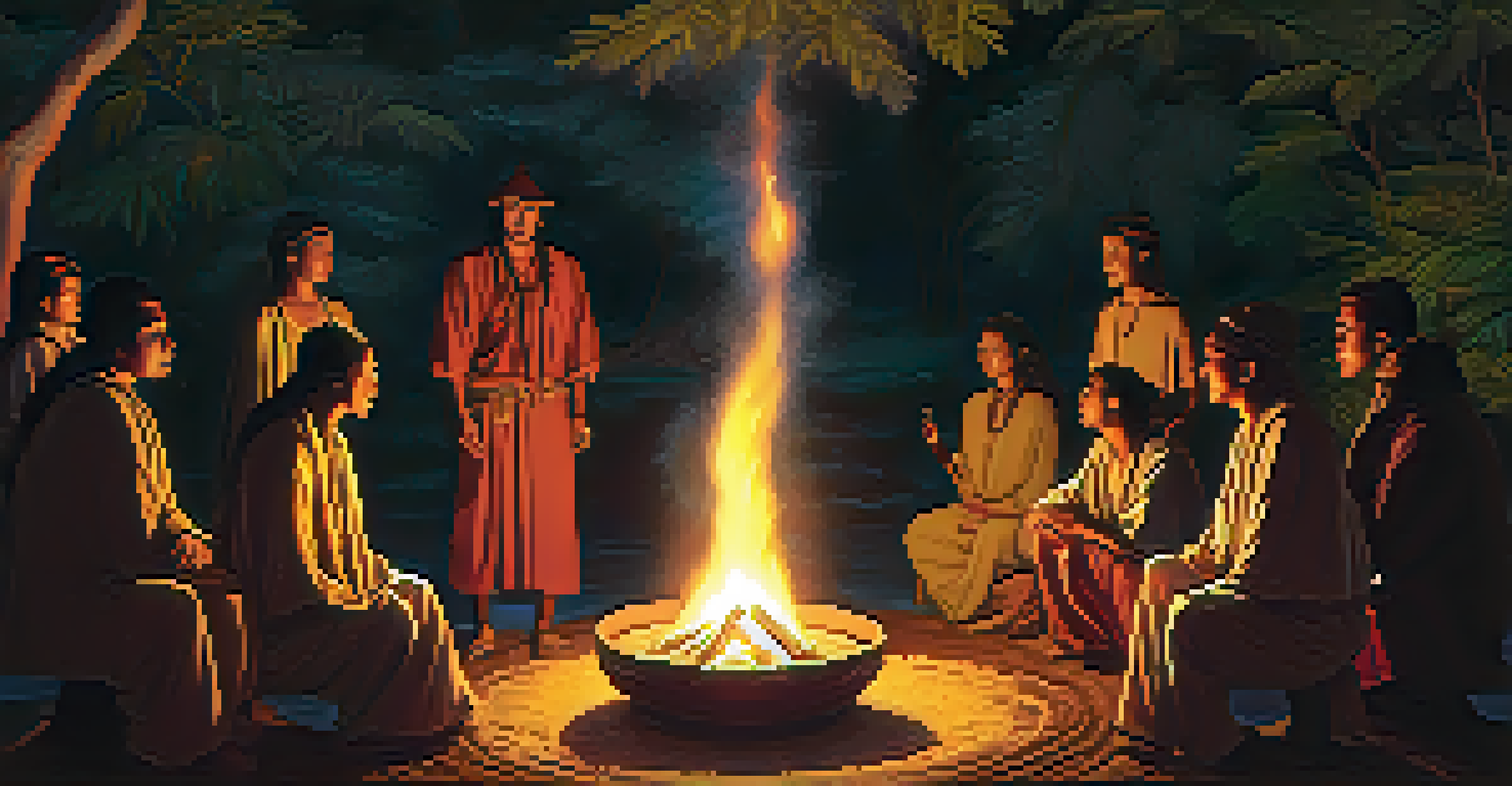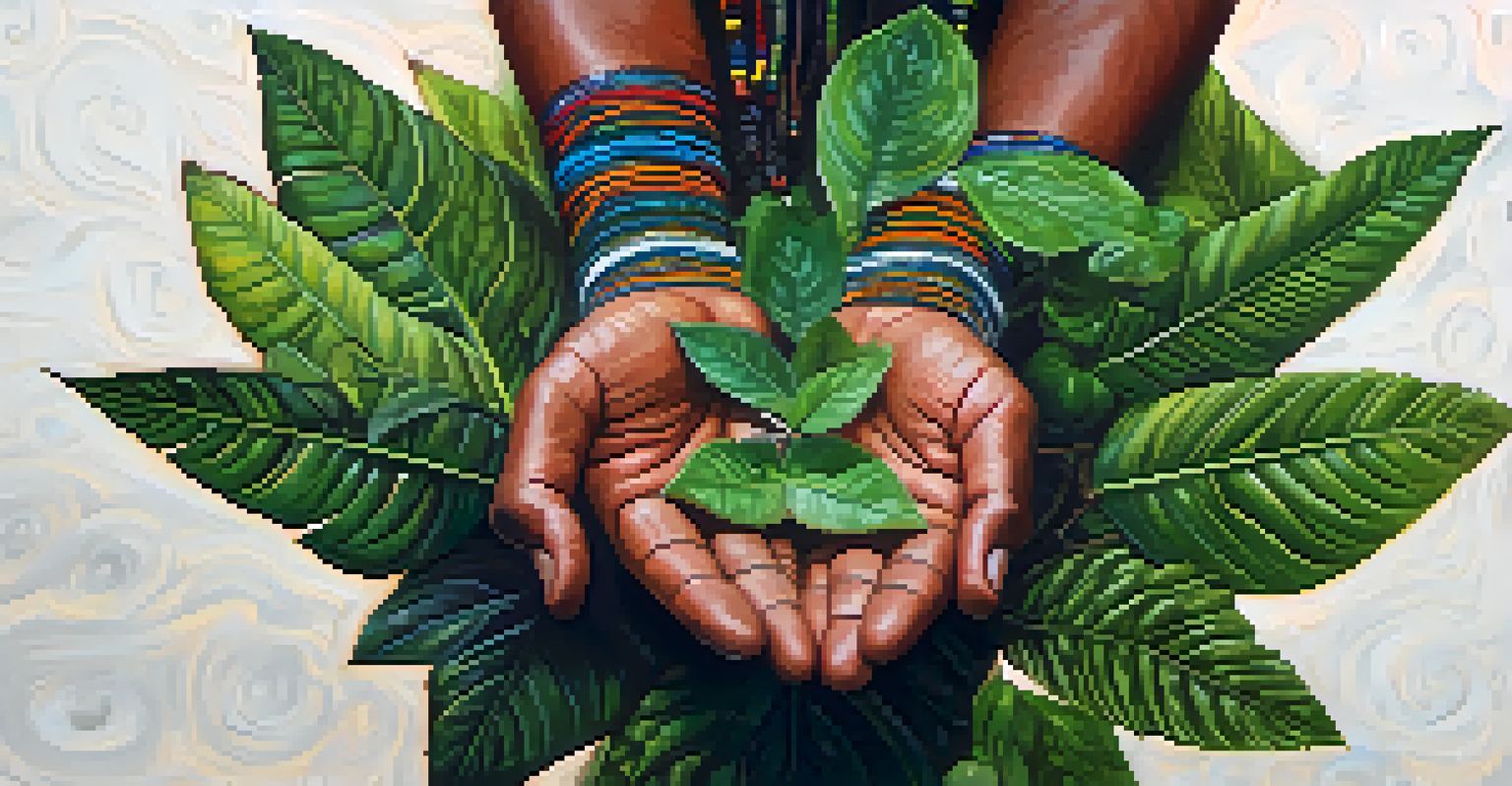Cultural Significance of Shamans in Ayahuasca Ceremonies

Understanding Ayahuasca and Its Cultural Roots
Ayahuasca is a powerful psychedelic brew, traditionally used by indigenous peoples in the Amazon Basin. It combines two plants, the Banisteriopsis caapi vine and the Psychotria viridis leaf, to create a profound spiritual experience. For centuries, this brew has been integral to cultural rituals and healing practices.
Ayahuasca is a teacher plant that reveals the interconnectedness of all life and the importance of healing.
In these ceremonies, participants often seek insight, healing, or connection with the spiritual world. The cultural significance of Ayahuasca extends beyond its psychoactive effects; it embodies a rich tapestry of beliefs and practices that have been passed down through generations. Understanding this context is essential for appreciating the role of shamans.
Shamans, or curanderos, are the spiritual guides who lead these ceremonies, bridging the physical and spiritual realms. Their deep knowledge of the plants, rituals, and the human psyche enables them to facilitate transformative experiences for participants.
The Shaman's Role in Ayahuasca Ceremonies
Shamans play a multifaceted role in Ayahuasca ceremonies, acting as healers, guides, and spiritual intermediaries. They prepare the brew, create a sacred space, and oversee the entire process to ensure a safe environment for participants. Their expertise is crucial in navigating the often intense experiences that Ayahuasca can provoke.

During the ceremony, shamans chant icaros—traditional songs that are believed to guide participants through their journey. These chants help summon protective spirits and create a harmonious atmosphere, enhancing the overall experience. The shaman's presence and wisdom often provide comfort and reassurance to those undergoing challenging moments.
Ayahuasca's Cultural Significance
Ayahuasca serves as a vital spiritual tool for indigenous peoples, embodying rich traditions and healing practices.
Additionally, shamans interpret the visions and experiences of participants, offering insights that can lead to personal growth and healing. Their ability to connect with the spiritual dimensions of the experience is what truly sets them apart as vital figures in these ceremonies.
Cultural Heritage and Transmission of Knowledge
The role of shamans is deeply rooted in the cultural heritage of indigenous communities. Knowledge about Ayahuasca and its uses is often passed down through oral traditions, with shamans training under the guidance of experienced practitioners. This mentorship is crucial for preserving the rituals and practices associated with Ayahuasca.
The shaman is a bridge between the physical and spiritual worlds, guiding us on our journey of healing and self-discovery.
Shamans often undergo rigorous training, learning not only about the plants but also the intricate spiritual and cultural beliefs surrounding them. This holistic education helps ensure that the ceremonies respect and honor the traditions of their ancestors. It also fosters a deep sense of responsibility among shamans to maintain the integrity of their practices.
As globalization increases interest in Ayahuasca, the importance of protecting this cultural heritage becomes paramount. Shamans are not just facilitators of experiences; they are custodians of ancient wisdom that connects people to their roots and the natural world.
The Therapeutic Aspects of Shamanic Practices
Ayahuasca ceremonies, guided by shamans, are often sought for their therapeutic potential. Many participants report profound emotional and psychological healing, as the brew can bring repressed feelings and memories to the surface. This process can lead to significant personal transformations, under the careful guidance of the shaman.
The shaman's role in this therapeutic journey is crucial. They provide support and guidance, helping participants navigate the sometimes tumultuous emotional landscapes that arise during the experience. This compassionate presence can make all the difference in how individuals process and integrate their experiences.
Shamans as Cultural Custodians
Shamans play a crucial role in preserving and transmitting traditional knowledge, ensuring the integrity of Ayahuasca ceremonies.
Furthermore, shamans often incorporate traditional healing practices into their work, such as the use of medicinal plants and rituals aimed at restoring balance. This holistic approach addresses not just the mind, but also the body and spirit, emphasizing the interconnectedness of all aspects of health.
Contemporary Interest in Ayahuasca and Shamans
In recent years, Ayahuasca has gained popularity beyond its traditional contexts, attracting individuals from around the world seeking spiritual awakening or healing. This growing interest has led to a surge in Ayahuasca retreats, often run by shamans who are eager to share their knowledge. However, this trend raises questions about cultural appropriation and the commercialization of sacred practices.
As more people participate in Ayahuasca ceremonies, the role of shamans becomes increasingly complex. They must balance the preservation of their cultural practices while adapting to the diverse needs and expectations of newcomers. This dynamic can sometimes create tension, but it also opens up opportunities for cultural exchange and learning.
Shamans today are not just spiritual guides; they are ambassadors of their cultures, sharing their wisdom while navigating the challenges of a rapidly changing world. Their ability to bridge these gaps is essential in maintaining the authenticity and integrity of Ayahuasca ceremonies.
Ethical Considerations in Ayahuasca Ceremonies
As the popularity of Ayahuasca grows, ethical considerations surrounding shamans and their practices have come to the forefront. Issues such as exploitation, cultural appropriation, and the commercialization of sacred traditions are increasingly being discussed. It is crucial for participants to approach these ceremonies with respect and an understanding of the cultural context.
Shamans have a responsibility to protect their traditions while also ensuring that participants receive authentic and respectful experiences. This includes being transparent about the origins of their practices and the potential risks involved in Ayahuasca use. Ethical shamans prioritize the well-being of participants, fostering a safe and respectful environment.
Ethical Concerns in Ayahuasca Use
As interest in Ayahuasca grows, ethical issues like cultural appropriation and exploitation must be addressed to protect its sacred practices.
As awareness of these issues increases, both shamans and participants are encouraged to engage in open conversations about ethics and cultural respect. By fostering mutual understanding and respect, the integrity of Ayahuasca ceremonies can be upheld, benefiting both the community and those seeking healing.
The Future of Shamanism and Ayahuasca Practices
Looking ahead, the future of shamanism and Ayahuasca practices is poised for evolution. As more people seek out these experiences, shamans will continue to play a vital role in guiding individuals through their journeys. However, this evolution must be approached with care to ensure that the sacred nature of these practices is preserved.
Shamans may increasingly find themselves balancing traditional practices with modern expectations. This might involve incorporating new therapeutic techniques or adapting rituals to fit the needs of diverse participants. The challenge will be to maintain authenticity while also embracing beneficial changes.

Ultimately, the future of Ayahuasca ceremonies hinges on the respectful collaboration between shamans and participants. By honoring the wisdom of indigenous cultures and fostering genuine connections, these transformative experiences can continue to thrive in a way that respects their profound cultural significance.